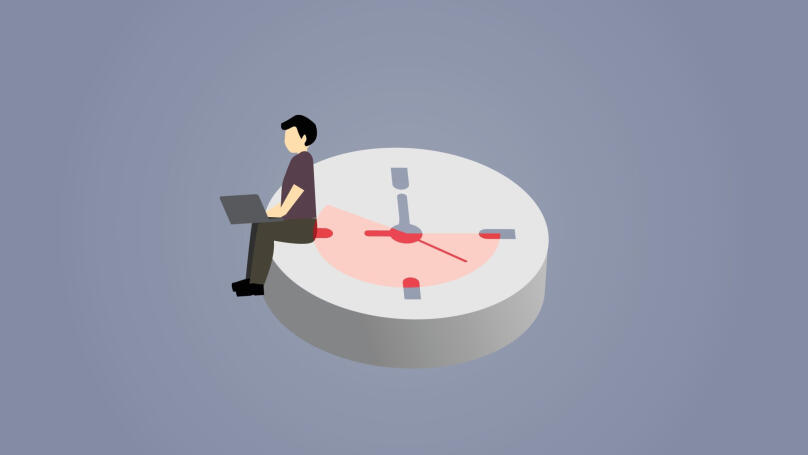Parkinson’s law

What is Parkinson's law?
Parkinson's law can be called several axioms, meaning the following: the work expands until it fills all the time allotted for it. In other words, the more time is allotted for a task, the harder it is for a person to perform it. In this case, the preparation for implementing a certain task is delayed, and the entire work process becomes much slower, which may entail the cost of additional resources, including financial problems for the business.
In 1955, when the British historian and journalist Cyril Northcote Parkinson first published his arguments in The Economist, people didn't take him seriously and even laughed at him. It was only decades later that society realised the relevance of his work. Indeed, although Parkinson's laws are not scientific principles, they largely control modern social life.
In total, Parkinson deduced three laws, basing them on observations of the British government agencies' work.
More about each Parkinson's law
The first law concerns the total amount of work, which will always depend on the time allotted. Parkinson states that the more time you have for a task, the longer you will work on it, no matter how small. This is largely due to the reluctance to receive a new task because as soon as you complete one job, another will immediately follow. Thus, even if a person faces an easy task, they will spend all the allotted time on it. Therefore, procrastination plays a key role in this case.
Meanwhile, the second Parkinson's law states that our expenses will always increase in line with income. So the more we spend, the more we earn. It works vice versa, too: as income increases, so do expenses, as you need to maintain a certain standard of living.
The third law reflects the philosophical theory and sounds like this: growth leads to complexity, and complexity is the end of the road. That is, after you have peaked or reached perfection in something, you will inevitably decline. In other words, any success is followed by failure, and victory follows defeat. That is also the life law of Parkinson's.
Parkinson's law of triviality

Typically, people talk about Parkinson's laws in the context of personal productivity, but these principles are most clearly manifested in group activities. So, Parkinson's law of triviality states that when working in a team, employees tend to devote too much time and attention to the most basic and trivial issues. The reason for this lies in the psychological phenomenon called "social idleness".
Social idleness occurs when people who work in a group on a common task make less effort because of collective responsibility for the result than when they lead individual projects and are also solely responsible for them. Simply put, personal responsibility decreases when it is shared among numerous participants. In addition, social idleness is characterised by a feeling of injustice in the distribution of tasks in a team and the belief that colleagues do not make much effort, which reduces the productivity of the entire group and, accordingly, money. It is due to social idleness that Parkinson's law of triviality functions (one might even say that they are synonymous in practice).
Parkinson's law examples
To explain how his laws work, Parkinson provided the following example.
If some old lady at her leisure decided to send a postcard to her niece, it would take her all day to do it. It would take her an hour just to find the postcard and then another hour to find the glasses. Then it will take some time to find the address, then she will have to write the accompanying text for the card and spend about another half an hour getting to the mailbox. And before that, she needs to decide whether she should take an umbrella and a scarf with her! This way Parkinson wanted to show that for a really busy person who has a bunch of other things planned for the day, going to the post office would take no more than a few minutes. Yet an elderly woman who has no more important and urgent things to do can stretch the most trifling process for a whole day.
Parkinson's law can also be observed in student life. Regardless of how much time was given to complete a particular task, the student is most likely to do everything at the very last moment. However, this way they will spend all the allocated time on one task, leaving themselves no opportunity to rest. This, by the way, is called the "student syndrome".
Moreover, if you are managing a project but do not have a clear deadline, then you are most likely to become a hostage to Parkinson's laws. The absence of a calendar plan always negatively affects the productivity of your work. On a psychological level, you do not feel the pressure of time and can slow down the process not only because of your unwillingness to continue but also due to a lack of concentration.
How to overcome Parkinson's laws

In fact, understanding the very laws of Parkinson's and their impact on our lives is already half the battle. However, to get rid of their negative impact, one should observe oneself more often, not lose contact with reality and develop a sense of time. There are also some tips for overcoming Parkinson's law from experts in the field:
Tip 1. Manage your time
If you plan deadlines and tasks in advance and make a personal schedule for a week or at least for a day, then your procrastination will most likely significantly reduce. Moreover, time management is about planning and setting priorities, which helps to cope with the rapid pace of life and avoid chronic fatigue and stress. You can use diaries, time trackers (special applications for recording and evaluating time) and mobile apps to achieve this.
Tip 2. Follow set deadlines
When assessing a situation, focus on how much time you need to resolve it, not how many hours you have left. To determine how long a task will actually take and set a realistic deadline, you should:
-
realise the necessary requirements, that is, form a general idea of what exactly needs to be done. It is best to make a list of sub-tasks and additional actions that you should complete in the process of working on the main task;
-
prioritise your actions, determine which tasks are paramount and more important, and which ones can wait;
-
determine who you need to call to help with the task. Asking colleagues for help and delegation saves time. But remember, this does not mean that you should shift your part of the work and responsibility to others!
Tip 3. Write down your goals
Write down your goal in your diary so that you can keep track of the steps you have taken to achieve it. Regularly review and record your progress towards this goal. You can call this reflective monitoring. Reflection is, first and foremost, self-discovery. With its help, it is easier for a person to determine their desires and actions needed to achieve their goals.
Tip 4. Use a timer at work
One effective way to avoid Parkinson's Law is to use a timer. Meaning, when you know that you only have a certain amount of time to complete a task, the temptation to drag out this process will disappear. For example, you can set a timer for 40-45 minutes, during which you need to complete a specific subtask as part of a larger project.
Tip 5. Take regular breaks
This tip follows on from the previous one. After working for a certain period, you need to take a break. This will help you avoid burnout and keep your focus. It is best to take a short break just when you start to be distracted by the environment, and your motivation noticeably decreases. Just make sure that this is not an excuse for procrastination, but actual fatigue. Additionally, be sure to change the place and activity during the break: leave the office, walk the floors or get some fresh air, leaving your phone at your desk.
Tip 6. Try practising work sessions
This technique involves 25-minute work sessions followed by five-minute breaks to increase your productivity while reducing mental and physical fatigue. After four or five such working sessions, you should take a longer break (about 10-15 minutes). This technique is similar in many ways to the Pomodoro technique, which you can also explore further.
Thus, Parkinson's laws can lead to loss of time, but do not forget that all people procrastinate. Once you understand how these principles work and affect us, you can use them to your advantage.























